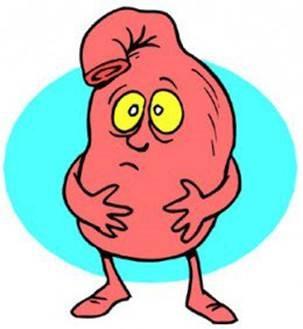But it's quite a different story when your stomach is sluggish.
Here's the scoop on having a pooped out stomach--otherwise known as gastroparesis.
Gastroparesis--the "paralyzed stomach"
Gastroparesis literally means "paralyzed stomach."
It occurs when the muscles in your stomach don't open properly to let your partially digested food (called "chyme"—pronounced “kime”) pass into the upper portion of your small intestine (the duodenum).
This is a serious matter for two reasons.
For one, the duodenum is the "Grand Central Station" of your GI tract. Here is where the most digestive action takes place--not in your stomach as so many people believe.
So if your chyme isn't passing into your intestinal hot spot like it should, your digestion can get majorly messed up!
And that can mean problems like gas, bloating, constipation, diarrhea and poor nutrient absorption.
You can also suffer from vomiting, nausea, heartburn and lack of appetite.
The guest that stayed too long...
The second reason gastroparesis is serious is because if your food isn’t moving along like it should, that means it's overstaying its welcome in your stomach.
When this happens the food can actually harden, forming a blob known as a bezoar and causing a blockage that can be life-threatening.
In addition, it can cause harmful bacteria overgrowth in your stomach, and make diabetes worse by hampering blood glucose control.
Why is my stomach too pooped to pop?
Causes of gastroparesis can vary and may include:
- Damage or malfunction of the vagus nerve that runs down from your brain stem, wraps around various organs and ends in your abdominal area.
- Diabetes--which can cause vagus nerve damage
- H. pylori infection in the stomach
- Medications (like anticholinergics and narcotics) that slow contractions in the GI tract
- Abdominal surgery
- Viral infection
- Autoimmune diseases
- Nervous system disorders like Parkinson's
- Idiopathic—no known cause
So what happens now?
Gastroparesis is usually diagnosed by a scope, ultrasound or a Smart Pill--a wireless electronic capsule you swallow that looks around at your innards, transmits data to a little receiver that you wear on your hip, and eventually makes its way to your toilet bowl.
As far as treatment goes, doctors usually aim for symptomatic relief, like drugs to control nausea and vomiting, or antibiotics for H. pylori or harmful bacteria.
Another option is medications like Reglan to stimulate the muscle contractions in the stomach. But that comes with a deadly price...because Reglan can cause an irreversible condition called "tardive dyskinesia."
Tardive dyskinesia is characterized by repetitive, involuntary, uncontrollable movements such as grimacing, sticking out your tongue, lip smacking, puckering, rapid eye blinking and limb movements.
I think I’ll opt for the slow stomach, thank you.
Safer, natural options
The good news is there are safer options that can help tremendously with gastroparesis including:
1) Probiotics
The friendly bacteria in your GI tract help to break down your foods and aid in nutrient absorption, plus they can help counteract any harmful bacteria overgrowth or H. pylori infection you may have. A full-spectrum probiotic formula like Super Shield can help repopulate your supply of these beneficial microbes and bring your flora balance back to a stronger, health-supporting range.
2) Make your meals easier to digest
When your stomach is challenged in its ability to move food through, then it makes sense to make your meals easier to digest in the first place.
Avoid eating proteins and starches together in the same meal. I know it’s not what you’re used to—most people eat meat and potatoes and similar meals—but this combination is extremely taxing on your body and is a leading cause of heartburn. Instead pair meats OR starches with vegetables and a salad.
You will be shocked at the difference it makes in your digestion.
3) Apple cider vinegar
Apple cider vinegar has also been shown to help the digestive process. Mix 1 teaspoon of apple cider vinegar in a glass of warm water and drink it 15 to 20 minutes before a meal.
Be sure to choose raw, unfiltered ACV that has “the mother.”
4) Vitamin D
Vitamin D plays a key role in the health of your enteric nervous system, and without adequate vitamin D, your immune, digestive and neurological health suffer. Unfortunately, it’s also a common deficiency, especially this time of year because people are not out in the sun.
A top-quality product like Optimum DK Formula with FruiteX-B® can help ensure you have enough of this crucial nutrient 365 days a year.
5) Acupuncture
Acupuncture can relieve gastroparesis symptoms like nausea, vomiting and bloating. It can also help improve neurological functions as well as boost immunity.
6) Lipoic acid
This is especially helpful for diabetes-induced gastroparesis. Lipoic acid helps liver function and regulation of blood sugar, plus it also happens to be an outstanding antioxidant.
Lipoic acid is available as a stand-alone supplement or as part of a complete multi-vitamin and mineral formula like Super Core.
See what a difference in can make to help kick your digestion into action and support your digestive and overall health!
To your health,
Sherry Brescia












I have been suffering from gastroparesis for almost 7 years that began with an h.pylori infection, worked up to IBS-C and then worked up to gastroparesis for the last 7 years. It is a living hell and until I took the smart pill, did not know that I was 96 hours behind in digestion. I live on all types of medication including LINZESS, DONNATAL, MARINOL, and POLYGLYGOLAX twice a day and also COMPAZINE for the nausea. I live on a basically liquid diet and what turns into liquid b/c all else clumps up in the cecum. I would suggest seeing a gastrodoc who is highly versed in motility. I wish you all luck.